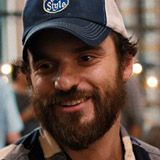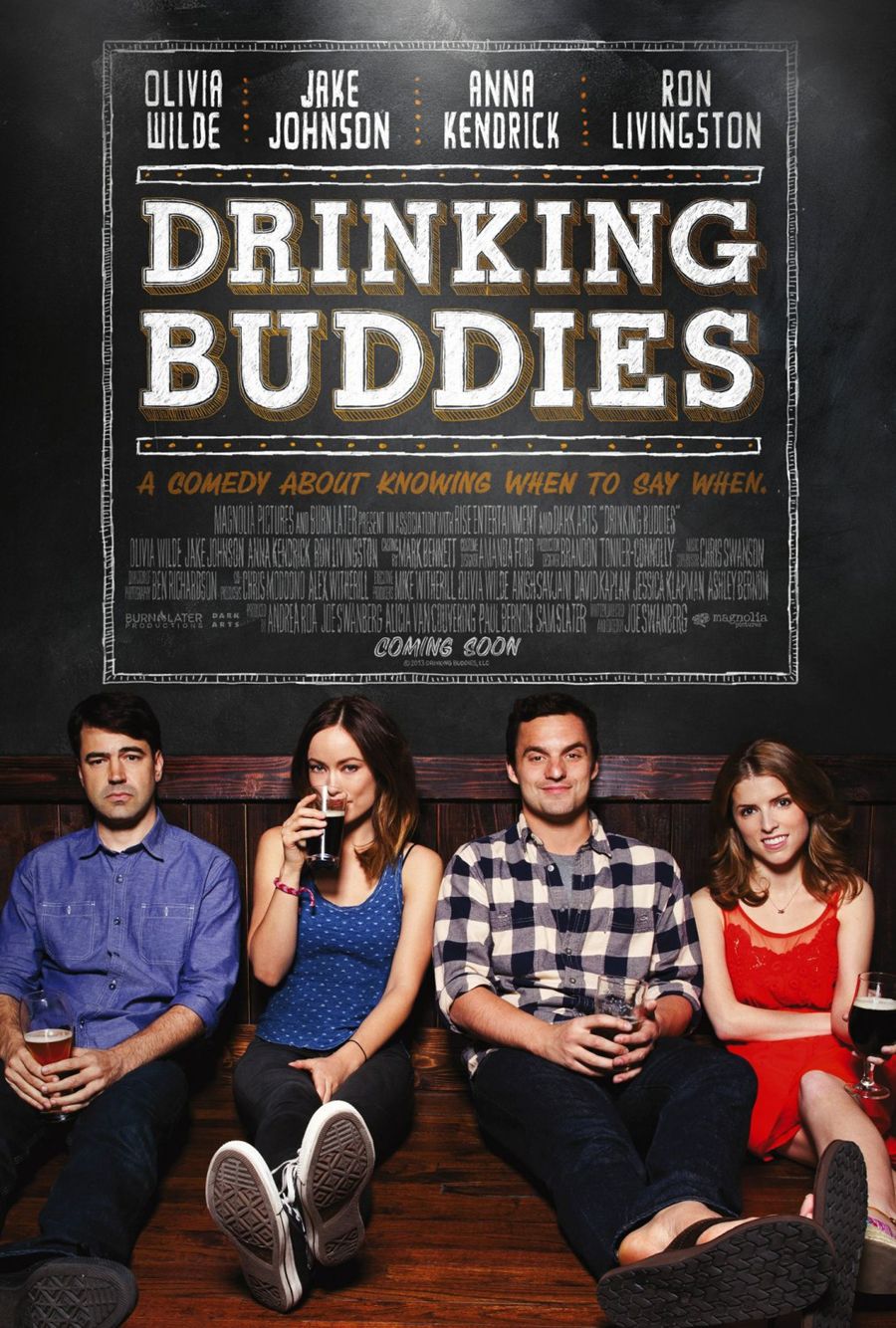In a matter of only a few years, Jake Johnson has made himself one of the most irresistible and in-demand actors in Hollywood. Notwithstanding his cameo performances in movies like A Very Harold and Kumar Christmas and 21 Jump Street, his turns in Ceremony and Safety Not Guaranteed revealed his skill at imbuing gut-busting humor with a palpable humanity, and his ongoing role as Nick on Fox’s New Girl has made him the cute, charming wise-cracker that every girl wants to end up with.
All of that makes his turn in Drinking Buddies both a departure from his previous work, and a weird encapsulation: Playing a worker at a brewery who maintains a friendship with his female boss that always flirts but never quite falls over into full-fledged romance, he finds a way to highlight his skills as that perfect best friend who possesses entirely the kind of substance that would also make for an interesting, passionate relationship.
Johnson sat down with Spinoff Online at the recent Los Angeles press day for Drinking Buddies, where he was wrapping up a day of interviews. While discovering a bowl of mints, Johnson offered insights into how he approached his character, discussed his collaboration with director Joe Swanberg, and provided an overview for how he tackles roles and develops his career.
Spinoff Online: Why don’t they have you in your beard on the poster for the movie?
Jake Johnson: Because Magnolia didn’t buy the movie until after I had to shave it. They wanted to control the poster.
I didn’t know if you looked too disreputable or something.
Yeah, they thought I looked too homeless (laughs). He’ll scare away audience members.
The film has so many unique scenarios that are both dramatic and seem incidental, or very natural. How many of those were constructed by Joe as he was directing and how many were sort of discovered after improvisation?
I don’t remember specifically on that, but what I do remember is the scene with Ron and Anna Kendrick, when they’re out on the woods, I didn’t expect that to be as funny as it was. When I heard about it and everything, I imagined it very awkward and stressful, but when I watched that scene, I went, that was way funnier than I thought.
You seem to use his hat a lot in key moments as a sort of signifier of his reaction. How purposeful is that, whether it’s deliberately symbolic or it ends up becoming something that is integral to defining him?
Well, I try to give myself as many toys, like I insisted on that hat. I insisted on that fake tattoo, that Chicago tattoo, so that when I had on short sleeves, I could see it, and there were certain [other] things. I really liked when my hand was hurt and I had that bandana, because there were certain things that when I would see them, I would think of Luke. So there were certain moves that I started just doing as Luke that I don’t do as me. So they wouldn’t be conscious, but there was a move that would just happen while I was in that environment that would become things that are in the movie. But they’re not necessarily planned.
Given that this film is so much about that unexpected possessiveness we feel about people we may not even be interested in, how much of his jealousy was a result of your deliberate effort, and how much came out of Joe’s editing of the material he shot?
I thought the emotions seemed pretty clear in each scene. So I knew like definitely, like, Ti West who’s in the movie and does a great job and doesn’t get enough credit, he plays a great character, that guy you just hate who somehow sleeps with the girl and you can’t figure out why – or you really don’t want her to ever have slept with him. It just ruins it! And I knew very clearly my character hated him – well, he liked him, but he was so jealous of what he did, so it was easy to play that stuff. Now, on the contrary, I had expected to hate the Ron Livingston character, and I wanted to play it that Luke doesn’t like Chris because he’s this older, richer guy, but the problem is that Ron is a very likeable guy, so when they call action, and he walks up as Chris and I’m meeting him as Luke, he’s still Ron Livingston in there and you still like Chris. So that was all a surprise, how much likeability Chris has even though he’s the guy who takes the girl. So a lot of it is planned, and a lot of it just happens in the moment.
There’s a great confrontation between Anna’s character and yours – and your reaction is so surprisingly nonchalant. How was that the appropriate reaction, to you?
Well, that was something that Joe and I talked about, because we knew she was coming to confess. And there was the version where we said, what if Luke confesses too? And then when we really thought about it, Luke wouldn’t – because his confession is way deeper. She kissed some guy. Luke was maybe in love with somebody else. But he wasn’t, but it’s gray, and now he still has to work with her. So the idea of it was when the scene starts, Luke’s thinking he fucked up, and now he’s losing the love of his life – for bullshit. How dumb could you be? Because the last thing he wants to do is be with Kate any more. And now he’s losing Jill too? And [Jill is] like, “I’ve got to tell you this,” and he’s waiting for the bomb of, “I don’t love you.” And when she goes, “I kissed Chris,” I think the amount of relief for Luke of like, “but we’re still together?” is like, let’s put all of that stuff in the past and just move forward. I think that’s for Luke the moment he’ll remember the rest of his life. I think Luke is going to be with Jill and he’ll try to marry her and have kids with her and the whole thing, and I think that moment, for him, is the beginning of the rest of their lives.
Given that epiphany, how aware do you feel like he is of the feelings he has for Kate, from the outset?
The way that I thought of Luke is that he loves Jill – I think he adores her, I think he always has, and I think he always will be. But he is smitten with Kate, and I think he deep down fears that Kate might be a better option for him, but he’s afraid to leave this love that he has. But a part of him thinks, maybe the grass is greener – and so the movie’s about him going and actually seeing. And then once he steps a little bit too far away from Jill and sees Kate for what she really is and what it would really be like to be with her, he runs back home.
In a movie that relies so heavily on improvisation, when for you feel like a character becomes crystallized?
Never fully. But I also don’t think I ever fully form a character on anything I do. I’m not a trained enough actor to do months of research before, and come in and know all of my decisions. I view acting like the Muhammed Ali quote about fighting: “Everyone has a plan until they’re punched in the face.” So for like the movie Safety Not Guaranteed, for example, I studied that script left and right, I had a read on the character, and I auditioned for it – and I viewed Jeff in a certain way. But we got to set and it was me, Aubrey Plaza and Karan Soni, and Colin [Trevorrow] pulled me aside and he goes, “What are you doing?” And I go, “I’m doing Jeff.” He goes, “That’s not Jeff. He’s way too likeable and friendly – Jeff’s a fucking dick.” I go, “No, he isn’t,” and he goes, “He has to be, Jake, and here’s why,” and then I went, well now I don’t know anything about the guy! And so then you just try something else. That’s how I felt about this – I had an idea of what I kind of wanted, but then all of a sudden you’re in a scene with Olivia Wilde and she’s doing something, and then all of a sudden the camera’s somewhere, and you just have to start going. And so I try to form a plan, but then I expect on Day One that someone’s going to hit me in the face and then it’s just a fight for as many rounds as you can stay in it.
Drinking Buddies is playing now in theaters.
Related: Ron Livingston on "Drinking Buddies," Improvisation and His Creative Process
Director Joe Swanberg on Jealousy, the Creative Process and "Drinking Buddies"


